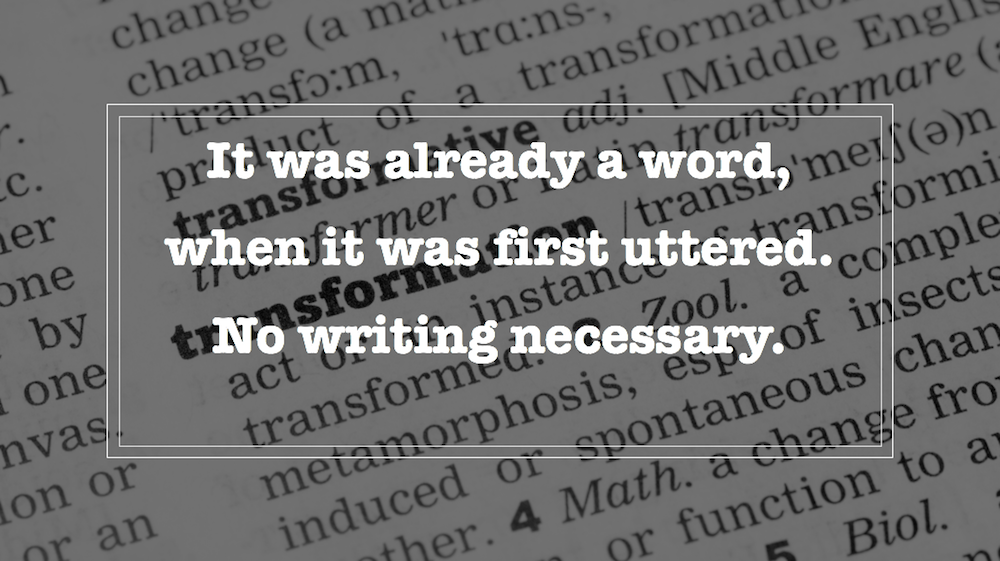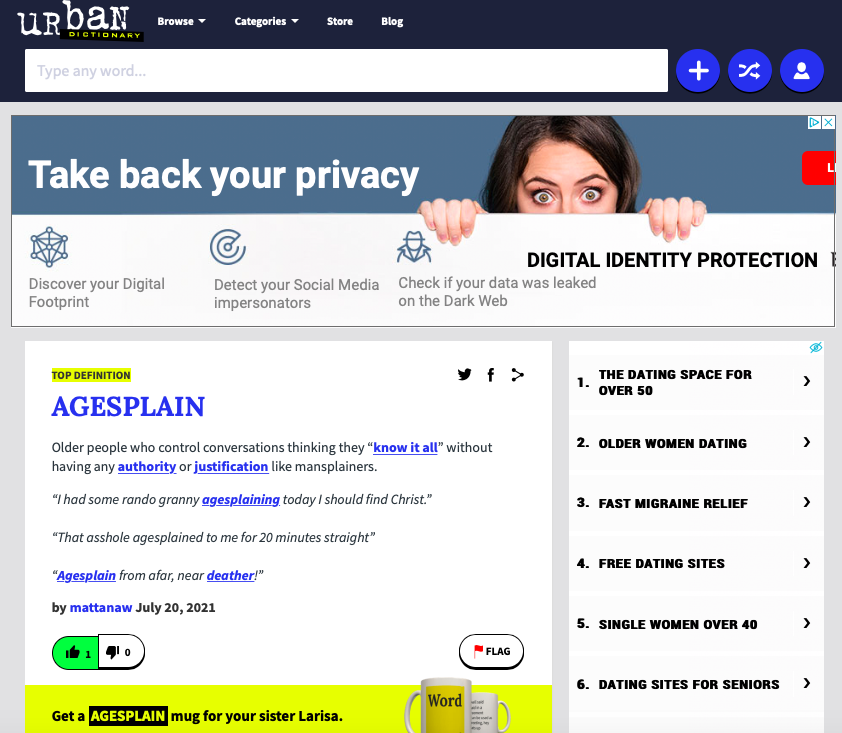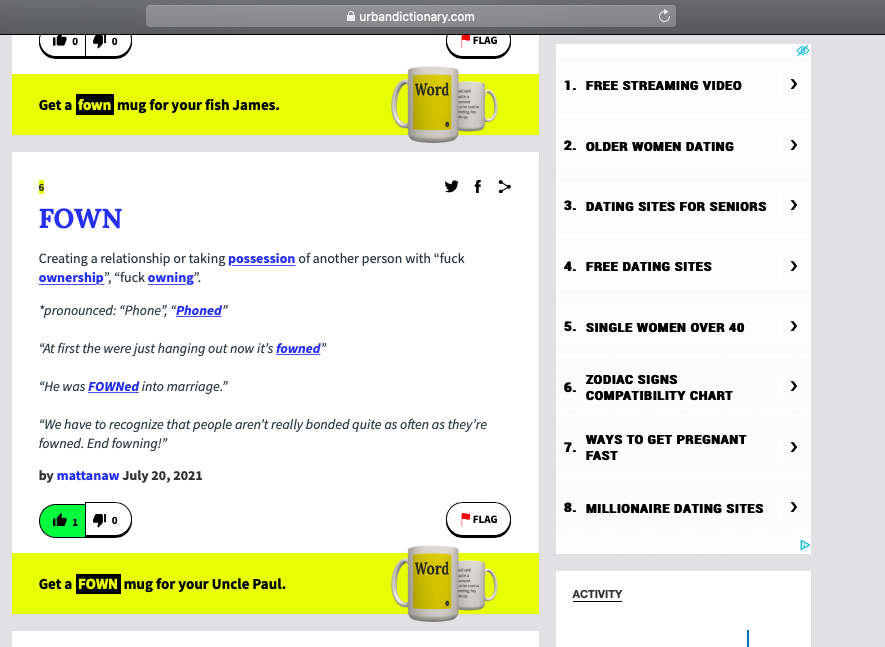
Glossary, Dictionary, and Wordly Coinages™
Monday, January 30th, 2023, at 4:25 PM New Plymouth, New Zealand Time
Contents
Introduction
The purpose of this glossary is to provide the my usages of terms as they appear in this Book and Journal, and a re-usable set of definitions I can use to self-clarify in discussions elsewhere. This glossary is unique, in that it provides meanings of words in a number of ways which are usually provided separately in reference materials we are familiar with. It provides what is expected at the end of text books for clarification of new terms students might be unfamiliar with. It also provides my clarified usages, in a similar way to what a dictionary would provide, but with less separate denotations and connotations, and more of a commitment to a single meaning (one explication or denotation). It also resembles what is provided in informal sources which is more openly willing to explain slang, and terms which are in common usage which are fun, or sometimes thought derogatory. The author does not think a reference to words in usage should be exclusive to words that some people think appropriate. Instead a more complete understanding of what is being said is desirable, along with artistic flexibility, and simply mental freedom, to utilize all words that one has available to explain or convey meaning. Thus some words which some might find out of academic usage will be available here.
Additionally, I have coined a number of words which first appeared on this site as “Wordly Coinages”. Coining words is a natural human activity which has resulted in all words that exist. I permit myself to coin words that are formal, and words that some might consider urban slang. Some words I have created have been added to urbandictionary.com, and some have entered more popular usage. I permit myself to create any words I like to my satisfaction and amusement, and also to supply the language where I find omissions or lackings. When we are using child-like humor we often create words which are uniquely ours, for our own personal fun and interests, or for use among friends and within families.
A note of interest here is that coinages are not all worth including in this glossary. Some meanings can be inferred from usage in-context, within the Book and Journal. Sometimes, I use alternative prefixing or suffixing, or word-build in a way that is more familiar to speakers of German. Using a word alternatively with a different form of suffix would not necessarily prompt or motivate me for adding it into this dictionary, since the meaning to a person who has mastered English already will be apparent. People who are longtime users of various dictionaries considered authoritative know they are not complete with respect to total words, and their various constructions. Oftentimes different verb or adjectival forms are missing. All word options for words listed are not included, but a master of English can, without having ever heard or referenced a word and all its options, know which options sound available as options for pleasing usage, or for utility. Especially creative speakers will find themselves adapting words at time of usage in ways that are unrecorded in references, and it would not be possible for an organically growing language, meaning a language that grows through uncontrolled, unsystematized, natural communal living, to be totally tracked and summarized. A dictionary is a short document compared with real authoritative, masterful, playful or artful usage.
Glossary
A
Argument
An argument, unless otherwise specified, is a linguistic presentation of a perspective using logic, starting with premises and ending with conclusions, and repeated and combined as needed to convey a point. Sometimes this is done in natural language as a lawyer does, without a really clear chain of logic. Other times, it proceeds more formally, and logically, in a way that resembles mathematical inference. Arguments here do not mean contests between parties. Instead it is more like providing a thesis and defending it, or providing a conclusion and the premises and rules of logic that lead to it. An objective of someone is providing arguments is to communicate with clarity something which they believe can be increasingly closer to proven, with greater detail and greater logical rigor. In science one would make arguments in defense of hypotheses that one finds to be especially convincing. Arguments are expected to be more collaborative and less combative, although it is known that some lay-people only understand by the word argument a kind of competition; but that is due, perhaps, to non-exposure to teachings about logic and logical conversation. When I make arguments in my essays, chapters, articles, etc… they are not combative in intent. They are argumentative in this more philosophical interpretation of the word, as used within the discipline of philosophy.
Atheist
Atheist, in my usage, simply means “not a theist”. This agrees with the usage that some guard emphatically; but not all make this usage. Some argue, that there is a system which corresponds to atheism, which certainly cannot be purported to my views. The prefix “a-” is a negation on the word “theist”, which provides my preferred meaning. It is not a word that successfully encapsulates or summarizes the views I have. It simply says I’m not a theist. Others would modify the negation to include what is implied by theist, which is deity believer. So additionally, they would mean “not a believer in a deity”. This meaning is not too unsatisfactory to me, and is closer to that simple definition that some defend staunchly. There is a small difference in that one seems to say “I’m not one of the theists” whereas the other says “I don’t believe what the theists believe,” which more specifically might be “I don’t believe in a deity.”
When it is stated that someone doesn’t believe what some others believe, or that they don’t believe that there is a deity, it does not say anything concerning what the person does believe, and people who say that they have the property atheist, would vary greatly regarding their other properties. I prefer to not use this word to describe what I do think, because again, since the word does not include what I think, but what I do not, it doesn’t describe my worldview. Since some have begin to think a worldview is described by the term, particularly those who have a worldview that includes belief in one or more deities, I think the usage has been excessively corrupted. I much prefer to self-describe what I am instead of using this word that says what I’m not.
Coined: Tuesday, July 20th, 2021
Agesplain
verb
- Older people who control conversations thinking they “know it all” without having any authority or justification like mansplainers.
Examples:
“I had some rando granny agesplaining today I should find Christ.”
“That asshole agesplained to me for 20 minutes straight”
“Agesplain from afar, near deather!”
Coined by: MATTANAW, Christopher Matthew Cavanaugh
Submitted first to Urbandictionary.com

B
Boredsolve, Boredsolved
Verb
- When you were bored and found a solution, and it was not all that fun, and you did it temporarily, or indefinitely.
“To boredsolve or not to boredsolve, that is the question.”
“You don’t like televised sports THAT much. It’s just boredsolved, admit it”
Coined on Saturday, October 23th 2021,
Coined by: MATTANAW, Christopher Matthew Cavanaugh
C
Cageism
Two alternate meanings:
- A pretend political movement mocking human behavior and commitment which is pro-cages. The pretend movement includes adherents called “cageists” who really want to continue the practice of animal bondage, keeping large amounts of animals in cages. Cageists are unconcerned about duration of encaging animals. Cageists are also or additionally interested in encaging people in various ways, including forcing them to reside indoors, or forcing people to expand populations in small containers, like small nations that are poor with excess population. Cageists are also promulgators of incarceration even of humans, themselves and peers.
- A person who holds beliefs which trend towards perpetuation of the use of cages. I.e. People who advocate for prisons are cageists along with people who behave with commitment towards perpetuating animal encagement (i.e. by eating products with commitment and disregard for sourcing from industrial caging facilities).
Related coinages: Cageism, cageist, cageophiliac, encageophiliac, cageophobic, cageomaniac, encageomancer, cageonometray, cegeonometrician, encagenobstectrics, millenialwokeuncageists, genzrevertocageophilistinism, boomercageist
D
Determinist
A determinist, roughly, is someone who thinks that all of life is causally predetermined. Someone who is a determinist might say that one’s life, in retrospect, appears orderly, because it has really proceeded in a causal and apparently predictable way, on information obtained later and on reflection. Determinism is opposed to views that thing that thinking and deciding are entirely unconstained. Instead, determinists think that education and knowledge, and a person’s physiological properties, and external situation, come together to form what happens next, including what one thinks next. The author has more to say concerning subtleties of determinism, and is himself a determinist, but only on his explication and description of determinism, which is partly exhibited by this definition, and what is written in his book.1
E
Earthnic
Adjective.
- “Earthnic Cleansing”
- Cleaning the earth of pollution, including all chemical pollution, and wrong minds. This is a supplemental process to death, and choosing which lives and biological characteristics to produce. Includes everything on earth, mental and chemical.
Coined on Friday, May 14th 2021,
Coined by: MATTANAW, Christopher Matthew Cavanaugh
Endoamorph
(ˈendəˌəˈmôrf)
Noun
- An endomorph who is somewhat amorphous in appearance.
Justification (as if one were needed):
I’ve been an endoamorph, and am an endomorph, so I have permission to coin this.
Coined on Saturday, February 23rd 2019,
Coined by: MATTANAW, Christopher Matthew Cavanaugh
F
Freethinker
A freethinker is someone who is undogmatic in their thinking, and has not committed to a particular religion. A freethinker is someone who thinks themselves free from religion, and able to select for themselves what they think to be true or false in the world, not relying on another necessarily to determine that for them. This is contrasted from dogmatism which is understood to be a receiver of truth, often from a source considered unquestionable, from an ancient text or a religious authority, or a combination of the two or both in different ways. A dogmatist would put the truth determination away from their own thinking on another source. Dogmatism is still thought to be different from trust of sources considered to have already performed the work of truth verification, and this is why dogmatism is more connected to religiosity and less connected to tentative trust in scientific findings which appear correct, but have not been completely examined. It is understood that a lay person, or person who has other work to do, cannot completely examine all that might be useful trusted without complete independent analysis. A freethinker reserves the freedom to do such an analysis if possible. A freethinker may also be someone who does not have the time to perform an analysis, or someone who is not sufficiently intelligent or adept, or experienced to do an analysis. Here much more can be said about this topic that is more than what is typically provided in a glossary, as there is vagueness and ambiguities which would not be conveyable to all who might benefit from usage of the term. “I’m free to decide on my own” is adequate to convey the typical usage which I find sufficient for my purposes, ignoring other commitments I have to determinism. A combination of words can be used to more adequately explain any particular freethinkers point of view regarding the meaning of their freethinking.
Falsepath & Truepath
Noun.
- “falsepathed” (alternative to “misdirected” or “red-herringed”)
- A mission, journey, or other behavioral direction, that cannot lead to the expected result. It can be short, or life-long.
“I became a born-again and was a tattooed Christian for 20 years before I realized I was falsepathed. Now I’m on a truepath, I think.”
“A huge number of people in History were falsepathed by their elders, parents and conquerors.”
Coined on Monday, Novmber 4th 2019,
Coined by: MATTANAW, Christopher Matthew Cavanaugh
Coined: Sunday, July 18th, 2021
Fown, Fowned
verb
*pronounced: “Phone”, “Phoned”
- Creating a relationship or taking possession of another person with “fuck ownership”, “fuck owning”.
Examples:
“At first the were just hanging out now it’s fowned”
“He was FOWNed into marriage.”
“We have to recognize that people aren’t really bonded quite as often as they’re fowned. End fowning!”
Coined by: MATTANAW, Christopher Matthew Cavanaugh
Unique denotation and indpendentently coined on Urbandictionary.com

G
H
I
J
K
Kolo
pronounced: Koh-loh
Verb
- To co-locate things that belong together. To put two or more things in the same place.
“Kolo it!”
“Kolo them!”
Coined on Sunday, October 20th 2019,
Coined by: MATTANAW, Christopher Matthew Cavanaugh
L
M
Miscellaneoused.
pronounced: miscellaneous-d
Verb, past tense.
- To become aware of and self-affirm belongingness in the full diversity and expression of sexual orientations, genders, sexual/gender identities, and related variants–particularly those pertaining to the evolution and growth of the LGBTQ movement (LGBTQIA+…).
“The movement includes everyone now. I’ve been miscellaneoused!”
Coined on Tuesday, October 22nd 2019,
Coined by: MATTANAW, Christopher Matthew Cavanaugh
Mnemonia
Coined: October 3rd, 2021
Like “Pneumonia”, but an illness whereby death is caused by a Memory.
When you remember something, and that memory results in your death. “Bro, I think that old rando died because of her Pedo Family Memoirs. And she got Mnemonia.”
“I didn’t realize being a mother would require, years of that…. Now I get heart palpitations from my terminal Mnemonia.”
“Woah, grandpa totally died in the ER, from COVID, but not even from COVID. He just remembered that time when… He had Mnemonia.”
“Mnemonia is when you can’t breath and die but because of your memories and not because of your Pneumonia”
N
Coined: Tuesday, July 20th, 2021
Near-Deather, Neardeather
noun
- Someone who is quite old or advanced in age enough to focus on their death more than their oldness. To be used against old ageists and others who fail to progress mindsets.
Examples:
“Don’t listen to that near-deather, he doesn’t know where or when he is.” “That neardeather over there is dragging me down.” “Those near deathers over their are watching their stocks again.”
Coined by: MATTANAW, Christopher Matthew Cavanaugh
Submitted first to <a https://www.urbandictionary.com/define.php?term=Near-Deather

O
P
Practentice
Has three separate meanings, two of which are related:
Pronounced: “Pract” “Entice”.
- To practice enticing, as with young girls learning to attract males.
Pronounced: “Pract” “entis”
- An apprentice who does too much practicing, or is not allowed to advance.
- Someone who practices and never gets anywhere, or doesn’t improve.
Q
R
S
Scrumpty, Scrumptious
Etymology: from Scrumptious, meaning tasty or delicious.
Adjectival form and noun forms:
- A very good looking person you wouldn’t mind having relations with. Someone who is scrumptious.
- “I was driving down the road and saw a chick who was totally scrumptious. She was scrumpty.”
- “OMG that guy at the bar was Scrumptyous. He was a Scrumpty.”
Scrumpty is also short for Scrumptyous.
Coined verbally approximatly 6 months before recording here, on Saturday, June 6th 2020,
Coined by: MATTANAW, Christopher Matthew Cavanaugh
Sinonym
Coined: July 11th, 2022
Verb: (Alternatively signonym).
When you’re just learning new languages to say you’re a 6 languager, but all your speed-learning is of synonyms.
Noun:
When in China learn Sinonyms so you can say the same things again over there.
Sino: (For Chinese, and for “Sign”, as in Chinese Signs). Verb: “You just Sinonymed yourself on interregional baby talk”
Why don’t you just Chinese yourself some Sinonyms.
Sleepdream
(slēp’drēm)
Noun
- A variant of dream.
Adjectival and verb forms can inferred by speakers of English. If it feels right or natural enough, it is correct.
Coined on Saturday, May 25th 2019,
Coined by: MATTANAW, Christopher Matthew Cavanaugh
Perhaps others have used it. In that case, credits to them. However, this coinage was made independently, and I laud myself for creating the same.
Snafüd, Snafood
Etymology: from Snafu, meaning a blunder. Food blunders are snafus relating to food. Combined we have Snafüd, or Snafood.
Verb, past:
- “You were Snafüd when at 2:00 am you had those extra 3000 calories.”
“Bro, why you gotta put meat in that vegan persons dish. You totally Snafood them.”
“This is a Snafüd that’s worth it. Next time I’ll change.”
The word is very flexible and can be employed how desired.
Coined on Saturday, October 23th 2021,
Coined by: MATTANAW, Christopher Matthew Cavanaugh
Speakdream
(spēk’drēm)Noun
- A dream that is spoken aloud as it is dreamt. A type of daydream.
Adjectival and verb forms, and others, can inferred by speakers of English. If it feels right or natural enough, it is correct.
Coined on Saturday, May 25th 2019,
Coined by: MATTANAW, Christopher Matthew Cavanaugh
Superpluralification.
Noun
- The process of creating a plural plural form of a word, including an extra “s”, for example, with the intention to show that there is a very large number of items in the set indicated, and not merely enough to make it plural once (i.e. via 2 or several more items and not just one). Often employed with a singular article to emphasize the absurdity of expecting only the singular form of the word.
“It all happened for a reasonss”
Coined on Thursday, October 17th 2019,
Coined by: MATTANAW, Christopher Matthew Cavanaugh
T
U
V
W
X
Y
Z
Published: Sunday, March 19th, 2019,
Originally published: Sunday, March 19th, 2019, on my Thoughtstream:
Is it Really an Analogy?
A friend recently posted an interesting analogy puzzle on Facebook, for which the answer was uncertain, because of a gap in the English language.
This is not unusual. It is very common for us to search for a word that is an antonym of another more familiar word, because we want to apply the same concept, in a converse situation. Whenever there seems to be a word missing for an occasion, an analogy could be formed, such that there would not be a word providing the answer in the language.
Consider this example:
Idyllic:Utopia::Hellish:
What is the answer?
In my days tutoring, I had a High School student ask me:
What is the opposite of a Utopia?
I asked myself this same question myself, after reading some of Moore’s Utopia, and reflecting on George Orwell’s 1984, and came to the answer after some pause, as is quite characteristic for me, of “Dystopia.”
(Aside: I have an excellent memory but have to fight against similar words to which I’m more primed to respond with, or otherwise have better availability. Everyone experiences tip of the tongue, but this appears to be a quirk that I’m not sure I’ve observed in anyone I met previously. I’m certain others experience the same but I have not encountered anyone who experienced it in quite the same way. Because after some time elapses, the word and quite a bit else becomes completely and rapidly accessible. A large chunk of memory simply isn’t available when first prompted at times. I mention this because it will become relevant in other posts.)
Answer:
Idyllic:Utopia::Hellish:Dystopia
In this case there is an answer. But what if the word “Dystopia” did not exist?
In that case, it is my view, that there probably is not an answer to the analogy, unless one can coin a word that truly fulfills the analogy correctly. By this I mean that it is a true analogy, without ambiguity, such that there is at least one denotation that clearly parallels the denotation of the other (meaning a complete dictionary would have a numbered entry for each word), and not a partial match among denotations, or a partial match among connotations. A word could also be borrowed from another language, which is essentially the same as a coinage, so I don’t see the two as essentially different, since the goal is simply to fill a gap in native language another word that fulfills some criterion of comparison.
However, there are unusual cases where the logic of the words themselves allows for no parallel at all. Such that a word borrowed from another language, or a coinage, does not establish an analogy, because the conditions of successful analogy cannot be established in the way hoped for.
This relates to the analogy that my friend posted. I will not repeat that analogy here for the moment, without his permission, but only mention that it is interesting and involved a probable structural asymmetry, meaning no analogy could be formed, at least in the way indicated, in what could be expressed about our feelings of past events, versus what we imagine about the future.
Notes
- 1. A person’s understanding of a word could not be provided only by an external dictionary. A person must be asked about what they understand a word to mean, in their many usages. They may not know always what they mean, because they may switch between meanings, and it is not always possible, to solidify entirely, what one thinks one means by a word. A person doesn’t have a list of word meanings in their mind like a dictionary. They have a word and many associations, and an incomplete ability to answer questions about how they would use it in all situations. This means they cannot answer what they mean by specific words in a way that will ever be entirely complete and true to their experiences, and accurate regarding its organization in their nervous tissue. Putting that potentially permanent issue aside for the moment, I would like to convey that, one must always have a combination of things to understand an author’s meaning. Firstly, something of an explanation that is brief that is imperfect in description like what is in a dictionary. Secondly, writings that do more to describe that exist in the corpus of their writings. I would not, in this dictionary, provide my complete view of what certain terms mean. The glossary and dictionary is a guide that provides better pointers to clarify meanings, that may be confused, because readers either may not know the meanings at all, or may have been exposed to different defintions and experiences. After getting pointers, I can provide the reader much more detail concerning what I think about it and what my commitments are. Words like “determinism” that use this footnote, are label terms. This means not only are they words to have short definitions, they are words that will themselves provide people visions about who someone is. A definition is not nearly enough information to say who someone is and what their commitments might be. For someone to fully understand what I mean by “determinism” one would have to read my writings that are specific to the topic of determinism, and any related works that go into more specific detail, providing greater elaborations and relationships to different writing and thinking contexts.

I am a retired executive, software architect, and consultant, with professional/academic experience in the fields of Moral Philosophy and Ethics, Computer Science, Psychology, Philosophy, and more recently, Economics. I am a Pandisciplinarian, and Lifetime Member of the High Intelligence Commmunity.
Articles on this site are eclectic, and draw from content prepared between 1980 and 2024. Topics touch on all of lifes categories, and blend them with logical rationality and my own particular system of ethics.